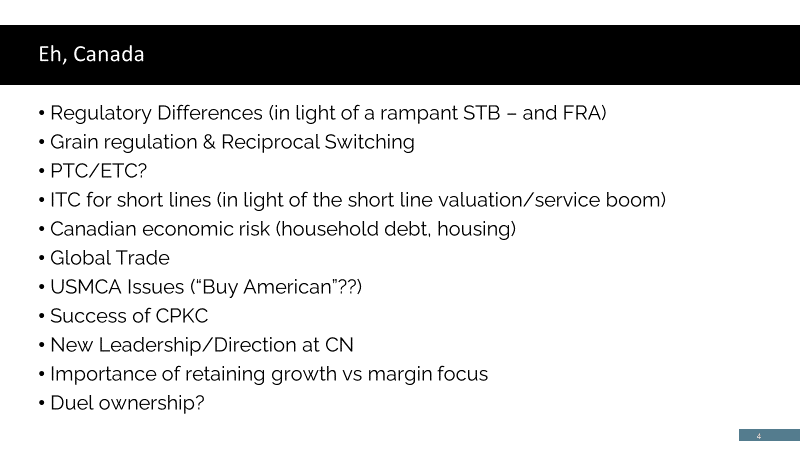Greetings from Georgia;
And, no, I am not early for the big Norfolk Southern Investor Day scheduled for tomorrow (Tuesday 12/6/22). I should be, but a prior customer commitment has me close but lacking a cigar. I will address it remotely. The meeting will be very important – the first of Alan Shaw’s captaincy (World Cup Fever – catch It!), will introduce new COO Paul Duncan to the financial masses, and will, I hear, focus on resiliency (even in the face of a possible economic slowdown) and, yes, Marty, growth….another setback to the Cult of the OR (even if the OR improves in the process). Maybe they will explain why they paid $1.6 billion for the Cincinnati lines they already controlled, and what TOP/SPG really means, so I can take the “?” out of my name for it. Stay tuned….
So I have issued plenty of "mea culpa apologies, so can I say this time the rail situation played out as I expected? With the PEB as a guideline and without a strike...
In the meantime, as mentioned and by now well-known, the rail strike was finally, officially, averted, put to bed, adios. OK, a new breed of “social-activist investor” has emerged to challenge sick leave policies at NSC and at UNP. And, on the order of paid sick leave, the court of public opinion was definitely against rail management (see: Rail Strike: Why The Railroads Won’t Give In on Paid Leave (nymag.com) among many other things. WashPo summarized the final congressional intervention this way: Why paid sick leave became a big issue in rail labor talks - The Washington Post. Note that after an hour's conversation, my quoted comments on “semi-slave labor” were not regarding the rather well-paid (with a 24% “bump” coming) rail workforce but a hypothetical case – that in the transition to service and growth, rail investors wanted to see a happier workforce with less attrition – see below, and NS’ comments tomorrow. Five points as we put this strike/contract issue to bed
1) This was not a worker revolt a la Starbucks, etc, but a regularly-scheduled contract (terms) renewal, made longer even by, you remember, the Pandemic, but one that always goes past the deadline (thanks to the almost 100-year-old RLA) and therefore almost always has back-pay, etc.
- The various sides – labor, management, shippers, regulators, Congress – played the cards they were dealt.
- The timing was perfect – for labor and the news.
- The court of Public (and congressional) opinion was played to, using all sorts of media.
- The story migrated from rail/transport news to business news….ultimately to political news, during which battle lines were hardened, sound bites weaponized and nuance lost altogether.
2) Crew scheduling is complex – on all sides – and yet never more important in a time of crew shortages and service issues.
- Think of seniority issues in all of the many (fallen flag) unions that make up one, say, conductor, workforce at any of the Class One railways.
- Flexibility is valued – by both sides (see deer hunting season in PA).
- Only lately the unions, specifically the 4 hold-outs and the BLET, focused on paid sick leave, often bargaining for other things instead (total compensation, long-term care – which is very generous, etc).
- The PEB, in their recommendations, came out against paid sick leave while analyzing disputes over attendance policy “We are simply not in agreement (with the unions) that this paid sick leave proposal is otherwise warranted or is the appropriate way to address the concerns”, also saying that the “nominally labeled sick leave days would be structured to be used on demand.”
- With the recommendations from the Democratically controlled (2:1) Presidential (appointed) emergency Board, allowed the rails to hold firm for the result that came from the House & Senate votes and the stroke of the President’s pen…
3) It was interesting to note that after the story moved to page one, the only thing believed from the railroad stance was the $2B/day hit to the economy. That was taken at face value, anyway….
4) The PEB (position) is not (that of) the rails! Rail labor was not forced to take the rail management contract (when “Biden sold out the unions” etc, etc - thanks Bernie) – the bill mandated a contract in which the PEB recommendations were the template, not the railway proposal – and were certainly skewed labor’s way (note the huge “true-ups” as the rails adjusted cash reserves and future models for the increased inflation in compensation.
5) The financial community is more sympathetic to labor than they, the STB, or the press believe; we want them to be happier in their work – and to widen the gap from high-paid rail workers and standard union wages that has historically existed. This is what I tried to stress in the WashPo article. Often (mostly) investors side with management in seeking efficiency – indeed this has happened with the rails (see the Cult of the OR).
- But with crews still short, hiring hard, training long, and attrition too high, our goals (service begetting growth), similar to the goals of the rails themselves as will hear from Atlanta tomorrow, are not those of the robber barons despite so many easy/sleazy comparisons in the past days….
- At RailTrends 2002 (and admittedly for a few years) the Class Ones have talked about changing the paradigm (sorry) in terms of management/labor relations, assigning smart up-and-comers to HR, etc.
USMCA update:

